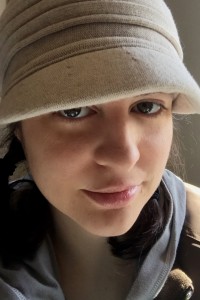I gave up the memory of my first kiss to fix the carburetor. It uncoiled from my mind like a constrictor that’d just figured out it was strangling a steaming pot of chicken soup, or the way an unclasped belt loosened and released a pair of tight hipster jeans from some skinny hips, maybe even Osmond’s.
Sitting in the attached garage surrounded by smudged grease, crumpled car parts, and a snot-filled rage that oscillated between “No, I’m fine” and “What the hell does any of it matter” I pictured that kiss as it slipped free.
It’d been awkwardly delivered by a girl in seventh grade, behind Hamilton Elementary School, where they parked the buses they didn’t have the funds to fix anymore. Her name was Abby Silver. She’d kissed me with open eyes and rubbery lips, and whispered my name, “Phillip?” as she pulled away.
Eventually, I couldn’t hold onto it and the memory became an object I couldn’t describe, like being told a word in an alien language and trying vainly to picture it. The first time I traded a memory, I tried to cheat the reaction by writing it down in exquisite detail first. Afterwards, it was like reading someone else’s diary, someone who knew you, but somehow in your small town, you’d never met. It gave me the uncomfortable feeling my life was being observed and recorded. I never tried that again.
When I looked back to my oil-stained hand, covered in little black cuts from torn steel, the carburetor looked solid and whole like a frozen gray heart. Even the dirt had been cleansed from its skin and my fingernails were angry dark crescents against it.
I was about to fix the radiator, crushed like a wad of spent tissue paper, when the screen door from the kitchen wheezed open. Osmond’s mother backed in with an arm full of laundry, untidy hair spilling over her lumpy black dress. I escaped out the side door before she saw me.
I headed towards the center of town, following signs of the accident. Using a memory from when I went to the water park forty miles away with my parents only to find that it’d closed, I uncurled the stop sign, putting it back into its stiff policeman’s pose, which only reminded me of Osmond’s father, red-faced and shouting in a world full of “No”. I ran from that corner, forgetting that I’d been trying to hold onto a memory, which one, I didn’t know, before it obliterated.
My physics teacher, Mr. Anderson —a puffy-eyed well-known bachelor who wore pink Hello Kitty! socks most days —had once explained that the second law of thermodynamics stated that entropy always increased.
The laws of entropy explained why life was always so complicated. Whenever Osmond and I skipped class behind the gym, he would smoke cigarettes and talk about whatever new band he was into, while I admired his pale, lean arms sticking out from an ironic Ramones t-shirt with expertly cut off sleeves. If either one of us was having a bad day, which was most of them for Osmond, we blamed it on entropy.
Why did Osmond’s dad drink whiskey and yell at him at night? Entropy. Why had the Grizzly Bears sold out on their latest album? Entropy. Why did there always have to be so much physics homework? Entropy.
The last one was all me, and a bit of a lie. Mr. Anderson was why I’d considered a career in physics and had even applied to MIT, his alma mater. But Osmond and I didn’t share any classes and I never had anything to really complain about, so I’d made it up.
But entropy couldn’t explain how I could exchange memories to fix things. By the second law of thermodynamics, I shouldn’t have been able to put things back to how they’d been before. Giving up the memory violated the law as much as the fixing did, because that made it like it had never happened.
When a cherry red Camaro drove past me on the way to the Quickie Mart, I used the epithets they hurled at me, ones I’d heard a hundred times before in this small town, and fixed the cracks in the sidewalk. I repurposed my memories so quickly, their insults burnt up on contact, like an icy rain falling into a hot fire.
I always wondered if the Streets Department ever noticed that the sidewalks and roads were in better shape than their age would indicate. Maybe they thought a concrete faerie was protecting its realm, and maybe it was.
When I got to the old oak tree that Osmond’s light blue Chrysler Dynasty had crashed into last week, I clasped my hand over my mouth, smelling the leftover oil and grease I couldn’t quite scrub free, and trembled like a knife thrown into the dirt.
Black skid marks stained the gravel-speckled street, turning to raw earth as the tires had hit the grass. The whole scene looked like a giant had punched the tree, dragging its Neanderthal knuckles through the dirt as it swung. Little bits of plastic were imbedded into the tree that had a crack wide enough to fit my hand snaking up the trunk. Already, the leaves on the north side had withered, curling up just like I had to do each night to get to sleep.
Fixing static objects like stop signs and carburetors was one thing. They were frozen entropy and maybe fixing them rearranged the atoms enough to satisfy the second law of thermodynamics. But living, growing things were another. They were entropy in motion, constantly changing and updating themselves.
I thought for a while about what memory would be strong enough to fix the tree. It would have to be something that went down to the core of who I was. I studied myself for clues: jeans so tight they looked painted on, a belt I painted gold because the stupid Sears here didn’t carry the kind of clothes I liked to wear, an aqua linen buttoned-down shirt.
The first memory I toyed with trading was the time Osmond and I were sitting on the picnic table someone had hauled out to Knoll Point, when we talked about my ability. I’d shown him how I could fix things, putting a broken pencil back together as proof. He asked if I could fix people. He had a hungry, vulnerable look about him. I tried to kiss him, but he pushed me back. It wasn’t like we hadn’t kissed before; we’d been having steady make out sessions for the previous month since we’d got drunk on cherry wine and I made my move.
“Can you fix people?” he asked again. “Can you fix what’s in their head?”
“What do you mean?” I asked in a throw-away voice, clutching my hands into fists.
He shifted on the table then, hands and face flinching in a syncopated dance, mouth jawing at the question he wanted to ask, but settling on the one that actually came out.
“My dad. Could you make it so he wouldn’t care?” he asked eventually.
I was so mad at the time, I didn’t even answer. I pulled out a lighter that we used for making cozy fires in the rock-lined pit, flicked the flame to life, and held my hand over it.
“Tell me you love me,” I demanded as I lowered my palm onto the flame. The pain bit into my hand, nerve endings searing and turning to black smoke. The outer layer of my skin cracked, black with char. My muscles jumped and flexed, ready to lift my hand free of the flame.
“I need a powerful memory to fix it,” I said through gritted teeth, imploring him with my face, constricted into a hideous mask to say the words.
“I love you, Phillip,” he said, his mouth opened into a wide circle of horror.
When I pulled the flame away, he grabbed my arm and turned my hand over, recoiling from the damage. Tears squeezed out of his eyes as he tenderly tucked my hair behind my ear.
I felt like such a bitch for tricking him like that, but I was mad at him that he didn’t love me like I loved him. I repaired the third-degree burns on my hand, with a memory I no longer remember, but it wasn’t what had just transpired between us.
When the flesh was knitted and whole, Osmond pulled back, and changed the subject to what we were going to do after school. Either I was a such a good actor that as I explained I thought I was going to go to Cal Tech to study architecture that he believed I traded away that memory, or that he was so wrapped up in the question he’d wanted to ask that he didn’t notice. Either way, that was the only time he’d ever spoken those words to me.
I left the old oak tree in the state I’d found it, realizing that if I kept trying to fix everything in this little town, I’d end up an empty husk of patchwork memories. Put enough holes in my past and eventually the lattice would collapse.
Hamilton General Hospital was only two blocks from the site of the crash. I snuck around the nurse’s station, using a guy rolling a rack of food trays with what seemed like a thousand quivering bowls of Jell-O as my shield.
Osmond was alone when I entered, his family had left for the day. His eyes were sunken and the mask over his mouth looked like something you’d see on an alien spacesuit. The tubes and wires turned him into a puppet that no one had bothered to animate. Only the faint mist of breath against the mask indicated he was alive.
I was sitting on the chair next to Osmond holding his hand when his father came in. He was wearing his Sheriff’s uniform. His jaw pulsed with an anger that made my eyes flick to the gun at his hip.
“I told you, you’re not welcome here,” he said, puffing up his chest. “You did this to him.”
I was glad there was a bed between us. Not glad, maybe frightened. Frightened of what I might have done if I’d been in the chair on the other side.
My lips hardened into knives, thin blades dripping with venom. “I wasn’t the one driving his car. Drunk.” He blinked. “And if you so much as touch me, I’ll tell every newspaper in the county about what happened.”
Osmond’s Sheriff father actually reeled on his feet as if I’d punched him right in the mouth. His knees buckled and his face went through contortions of thought as if he were walking across hot coals.
Osmond and I had been making out in his light blue Chrysler Dynasty when his father had found us. There was no question to what we were doing, Osmond’s hand was down my pants when the flashlight burned into the car.
His father had yanked me out, shouting gin-soaked curses. Osmond tried to defend me, clawing at his father like a wounded cat.
Osmond’s father never hit me, but I wish he had. Maybe then he wouldn’t have driven away in a drunken rage.
Osmond was shoved into the passenger seat, and the Dynasty spat gravel in every direction before fishtailing down the road, leaving the Sheriff’s truck idling by the side of the road with the door open and the lights on. I shuffled back into town, puffy-eyed, and came upon the wreck after the ambulance had already left.
The airbags had deployed, but the passenger side of the Dynasty had slid into the old oak tree and Osmond’s head had hit the glass so hard the concussion put him into a coma.
His father sank into the chair across from Osmond’s lifeless body and sobbed into his huge hamhock hands. When he finished twenty minutes later, he didn’t look up, and said these words as if nothing had transpired before: “I just want my son back.”
After the Sheriff left, I placed my other hand on Osmond’s and squeezed.
The funny thing about entropy was that as chaotic and destructive as it sounded, it was quite life-affirming. A static Universe was just a button of unreleased matter. A flower that couldn’t bloom was dead.
I placed my fingertips on his temples and summoned the memories of Osmond and I together: the way his smile twitched when he was thinking of me, his lean hips, laughing at the jocks sweating on a hot August day in their football pads, the taste of mint as he kissed me, skinny-dipping in Miller’s Creek before we both knew, the glorious burning entropy of the night sky as we lay on a blanket on Knoll Point holding hands and whispering to each other as if we might disturb the heavens.
Just as I was leaving the hospital room, the boy who’d been laying in the bed was awake. His brown eyes locked with mine as he pulled the mask down.
“Phillip,” he said, his tone imploring me to stay.
“You’re Osmond, right?” I asked, one foot in the antiseptic hallway.
His eyes flickered with confusion, twice, as if the first time wasn’t enough. He looked at the bed and the medical equipment which brought signs of recognition.
“Yes,” he said, his lips curling into disappointment. “Have a good time at Cal Tech.”
“How did you know I was going to Cal Tech?” I asked, stunned and trying to remember why I’d come to the hospital in the first place. I guess it was because I went to school with Osmond. I probably had a crush on him, though I’d never let him know it.
He looked around the room as if he was trying to find a script to read from.
“I guess I heard you mention it in class,” he said, dejected, which confused me in turn.
“Well, have a great life,” I said, and left the room.
I thought I heard something that sounded like, “I love you,” from his room. I hurried back in, my heart beating like a thunderstorm, hands and face tingling with electricity.
“What did you say?” I asked, breathless.
Osmond paused for a moment before saying, “You, too.”
The words dropped unceremoniously from my lips, “Oh, thanks.”
I left Hamilton General Hospital with the nagging feeling I was forgetting something. I’m sure it had something to do with leaving town in a few months. Maybe I was a little disappointed that I was almost eighteen and I’d never had a first love.
But that’s okay; I’m a flower bud buzzing with entropy. Someday I’ll bloom, and it’ll be glorious.
© 2017 by Thomas K. Carpenter
Author’s Note: A couple of different scenes sort of grew together in my head as I was contemplating the idea of trading memories for magic. The first was the protagonist cradling a greasy carburetor. I didn’t know why at the time until I had the scene with the lighter come to me on a run (I get my best thinking done when exercising). The rest just snowballed from there.
 Thomas K. Carpenter writes in a variety of genres including: post-cyberpunk, historical fantasy, YA dystopia, alternative history, steampunk, and contemporary fantasy. His short fiction can be found in Ellery Queen’s Mystery Magazine, Abyss & Apex, Galaxy’s Edge, and other publications including this one. The Alexandrian Saga, his best-selling alt-history series, has reached readers worldwide, while his current series, The Hundred Halls, is a cross between Harry Potter and Supernatural at university. The first four books of the series can be found on Amazon, starting with The Trials of Magic.
Thomas K. Carpenter writes in a variety of genres including: post-cyberpunk, historical fantasy, YA dystopia, alternative history, steampunk, and contemporary fantasy. His short fiction can be found in Ellery Queen’s Mystery Magazine, Abyss & Apex, Galaxy’s Edge, and other publications including this one. The Alexandrian Saga, his best-selling alt-history series, has reached readers worldwide, while his current series, The Hundred Halls, is a cross between Harry Potter and Supernatural at university. The first four books of the series can be found on Amazon, starting with The Trials of Magic.
If you enjoyed the story you might also want to visit our Support Page, or read the other story offerings.









 A runner, writer, reader, teacher, and parent, Daniel
A runner, writer, reader, teacher, and parent, Daniel